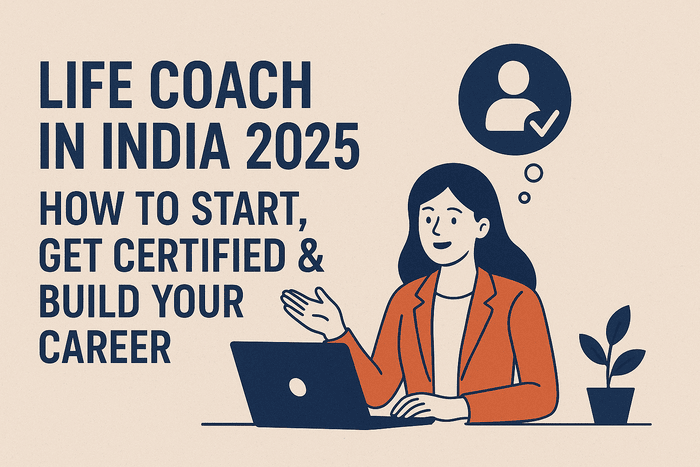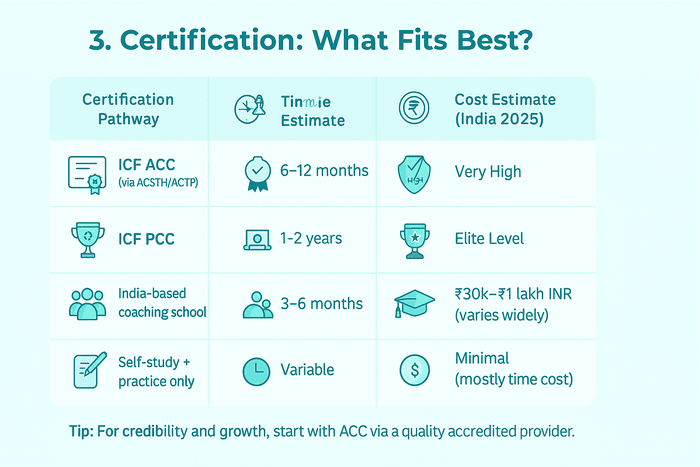Introduction
Becoming a life coach in India in 2025 is not just about having helpful advice—it’s about building a trusted, credible practice that blends human empathy with professional standards. The life coaching industry in India is booming, particularly as professionals, students, and entrepreneurs seek clarity, motivation, and direction.

This guide walks you through:
- Why life coaching is a compelling profession in India today
- Steps to launch your career (with certification options)
- Certification pathways—what’s credible and recognized
- Pricing, timelines, and costs specific to India
- Building authority, credibility, and clients
- Marketing and sustaining your practice long-term
- Common mistakes Life Coach Do (and what to do instead)
1. Why Become a Life Coach in India in 2025?
Market Trends
- A growing gig economy, young professionals navigating career changes, and a shift toward well-being have fueled demand for life coaches.
- Corporates are increasingly offering coaching to boost employee performance and wellness.
- In a market where untrained “coaches” coexist with credentialed professionals, credible certification can differentiate you.
Benefits of a Life Coaching Career
- Flexibility: Work remotely or in person; set your own hours.
- Impact: You help clients make meaningful life changes—career pivots, emotional growth, balance, transitions.
- Earning Potential: With experience and structure, coaches in India can earn from ₹2,000 to ₹10,000+ per session or package.
2. How to Start Your Life Coaching Journey
ICF (International Coaching Federation)
- Credentials: ACC → PCC → MCC.
- Education pathways: programs are mapped to Level 1 / Level 2 / Level 3 (successors to ACTP/ACSTH), and you’ll also complete mentor coaching, performance evaluation (recorded session), and an exam. apps.coachingfederation.orgICF
- 2025 update: ICF is streamlining ACC and PCC application pathways effective November 3, 2025 (two routes for each—based on your education background). ICF
- Exams: As of 2025, ICF uses a dedicated ACC exam (launched Nov 18, 2024; fully in force for ACC candidates from March 14, 2025) delivered via Pearson VUE test centers or online proctoring. ICF+1Pearson VUE
EMCC (European Mentoring & Coaching Council)
- Individual accreditation (EIA): Foundation, Practitioner, Senior Practitioner, Master Practitioner—level depends on training, experience, and evidence of competence. Programs can also hold EQA (education) accreditation. emccapr.orgEMCC Global
Which should you pick?
In India, ICF is most commonly recognized by corporates and HR/L&D procurement; EMCC is equally respected globally and emphasizes reflective practice and supervision. Choose the route that fits your learning style, mentor network, and target market.
3) Step‑by‑step: from zero to working coach
Step 1 — Choose your niche (so clients know when to hire you)
Pick one problem + audience where you have lived context:
- Career clarity & job transitions
- Executive/leadership presence
- Stress, resilience & burnout recovery
- Productivity & habits
- Relationships & communication
Your niche guides messaging, case studies, and pricing. You can always broaden later.
Step 2 — Select an accredited training pathway
Use ICF’s Education Search Service (ESS) to find Level 1/2/3 programs (India and global online). For EMCC, look for EQA courses aligned to the level you plan to apply for (EIA). This protects your investment: education hours, mentor coaching, and assessments count toward credentials. apps.coachingfederation.orgEMCC Global
Step 3 — Earn your first credential (ICF ACC or EMCC EIA Foundation/Practitioner)
ICF ACC typically includes:
- Education: at least 60 hours of coach‑specific training (via Level 1/Level 2/ACTP or ACSTH/Portfolio combinations).
- Experience: 100+ coaching hours with at least 8 clients (75 paid; 25 in the last 18 months).
- Mentor coaching: 10 hours over 3+ months with an eligible mentor coach.
- Performance evaluation: recorded session assessed against ACC minimum skills.
- Exam: ACC exam via Pearson VUE after your application is approved. ICF
Timeline clue: ICF notes performance‑evaluation review often takes 4–6 weeks; build that into your plan before scheduling the exam. ICF
EMCC EIA: apply at Foundation or Practitioner level depending on training hours, practice, and evidence of competence; you’ll document reflective practice and supervision. emccapr.org
Step 4 — Log hours ethically and get mentored/supervised
Practice coaching (pro‑bono → low‑fee → paid), keep confidential logs, and maintain clear coaching agreements. Regular mentor coaching and supervision sharpen skills and keep you aligned to ethics. ICF
Step 5 — Apply for your credential
Use ICF’s application portal (credential path survey → upload evidence → schedule exam). Keep certificates, logs, mentor details, and recording transcripts handy. ICF
2025 pathway simplification: from Nov 3, 2025, ACC/PCC application routes consolidate into two clearer paths—confirm which your education supports before you submit. ICF

4. Costs and Timeline: India-Specific Estimates
- ACC via Accredited Program
- Training fees: ₹70k–₹1.5 lakh (self-paced vs cohort)
- Mentor coaching: Often included; if separate, ₹3k–₹10k per hour
- ICF application and exam: USD 300–800 (~₹24k–₹64k)
- Total Estimate: ₹1 lakh – ₹2.5 lakh
Timeline:
- Training + mentor coaching + hours accumulation: 6–12 months
- Application & evaluation: Additional 4–8 weeks
- Non-ICF Indian Certification
- Fees: ₹30k–₹1 lakh depending on institute
- Timeline: 3–6 months (certification only, without practice-building)
5. Building Authority & Your Coaching Brand
A. Create a Professional Online Presence
- Website/Blog: Write SEO-rich articles like “How to find meaning in your career”—optimized with heading structure and target keywords (e.g., ”life coach India 2025”).
- Social Proof: Share testimonials, video interviews, or before-after coaching stories.
- Social Media: Use LinkedIn and Instagram to post short coaching tips, client wins, and insights.
B. Content & SEO Strategy
- Long-Form Articles: 1,500–2,500 words addressing specific client pain points (e.g. “How to transition from IT to entrepreneurship”).
- FAQs & Schema: Use FAQ structured content— schema for better SERP visibility.
- Media Richness: Include infographics, quotes, short explainer videos.
C. Leverage Local Networks
- Join ICF India Chapter events for peer learning and visibility
- Offer mini-workshops or free webinars for local communities or SMEs
D. Referrals & Collaborations
- Host free coaching sessions for HR professionals or women’s collectives
- Partner with career counselors or universities for workshops
6. Pricing & Packaging Your Services
Entry-Level Coaching Rates (India 2025)
- Per session (60 mins): ₹2,000–₹5,000
- 3-month coaching package (6–8 sessions): ₹15,000–₹35,000
- 6-month executive/personal transformation package: ₹50,000–₹1,00,000+
Pricing Strategy Tips
- Offer an introductory “clarity call” (15–30 mins) to onboard clients.
- Use a package model for better revenue predictability.
- If collaborating with corporates, negotiate per-hour or per-package rates (HR budgets typically allow ₹10,000–₹20,000 per coaching hour depending on client seniority).
7. Sustaining & Growing Your Coaching Career
A. Continuing Education & Renewal
- ICF ACC requires 10 Continuing Coach Education Units (CCEs) for renewal every three years.
- Attend advanced workshops—topics like positive psychology, neuroscience in coaching, AI-augmented coaching techniques, etc.
B. Diversify Your Offerings
- Group coaching programs or retreats
- Online mini-courses: “30-Day Clarity Challenge” or “Goal Accelerator Bootcamp”
- Digital products: guided journals, workbooks, meditations
C. Referral & Alumni Growth Loop
- Encourage referrals by offering discounted follow-up sessions to both existing clients and referred new clients.
- Create an alumni group on WhatsApp/Telegram to nurture continuing relationships and upsell group programs.
8. Common mistakes Life Coach Do (and what to do instead)
- Choosing a non‑accredited course and later realizing your hours don’t count.
→ Verify on ICF ESS or EMCC’s accreditation pages before paying. apps.coachingfederation.orgEMCC Global - Neglecting mentor coaching/supervision.
→ It’s required/expected on recognized pathways and accelerates your skills. ICF - Rushing the exam without performance feedback.
→ Use recordings + transcripts, get feedback mapped to ICF competencies, then schedule Pearson VUE. ICFPearson VUE - Ambiguous offers (“general life coaching, any goal”).
→ Sell outcomes (e.g., “career pivot plan in 8 weeks”), not vague time blocks. - Ignoring SEO basics.
→ Add question‑based headings, meta, internal links, and FAQ/HowTo schema; update content after core updates
9. Final Thoughts: Plan, Practice, Impact
- Define your focus: Target audience + outcomes + differentiators (your story, background, wins).
- Get credible training (preferably ICF ACC), build coaching hours, mentor coaching, and certification.
- Launch with a starting package, gather client testimonials, and invest in content that attracts your niche.
- Diversify, innovate, and grow with continual learning and refining your offerings.
Life coaching in India in 2025 is a field of both real impact and viable entrepreneurship—but success comes from combining heart-centered practice with structure, marketing savvy, and credibility. You’ve now got a clear, practical blueprint to start, get certified, and scale a coaching career that lasts.











